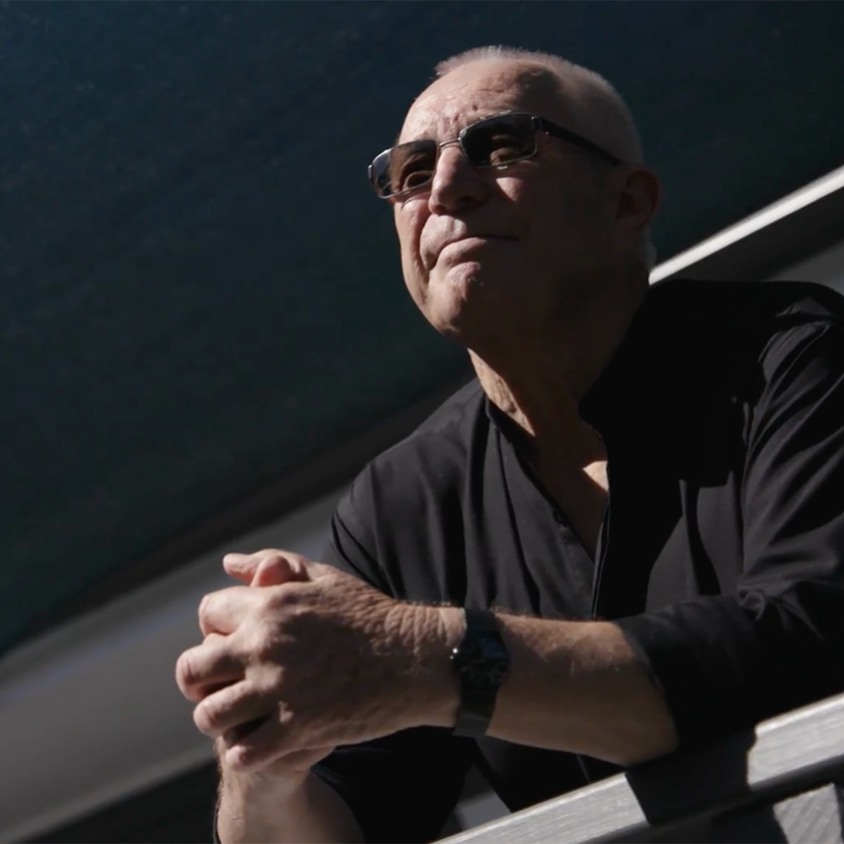After treatment for prostate cancer, men in Victoria’s Gippsland region reported big problems with sexual function in much higher numbers than the rest of the population. Using telehealth to deliver psychology and education on sexual health, incontinence, exercise and diet, this intervention reduced problems with sexual function by 60%.
True North Care Coordinator Sam Gebert has a special technique to help men feel comfortable enough to discuss their most personal feelings about their private areas.
“After I broke one of my surfboards, I found an old surfboard that was in the back of the shed. I picked up this surfboard and took it out surfing. And the beauty of this surfboard was that I'd actually forgotten how good it was.”
Mr Gebert has used this story often to talk to men who are struggling with their sexual relationship after treatment for prostate cancer. Almost half of all men treated in Australia report some degree of problem with their sexual function.
“OK it was a little bit slower than the shorter surfboard that I had, but when I was surfing it was perfect. It was slow, it had good grip, it was easier to stand up on, it was smooth. You could caress the wave, there was a lot more to surfing on this board than just the final consequence – getting into the shore and nailing the big wave.”
The sporting equipment analogy changes from surfboards to golf clubs or whatever interests the man that Mr Gebert is talking to. The key is to start a conversation and enable him to feel comfortable enough to talk about his problems with sexual function.
It’s a conversation he’s had with several men in Victoria’s Gippsland area as part of a pilot program created by TrueNTH. Funded by the Movember Foundation, TrueNTH provides practical support services to improve the quality of life for men with prostate cancer.
Health services are limited in Gippsland and there are long distances to travel, which often leads to poor outcomes for men with prostate cancer. Men in Gippsland reported higher levels of sexual problems in a survey collected 12 months after treatment as part of the Prostate Cancer Outcomes Registry – Australia and New Zealand (PCOR-ANZ).
Also funded by the Movember Foundation, the Registry records the diagnosis of men with prostate cancer, then surveys them a year after treatment, or if they don’t have treatment, a year after that initial diagnosis. There's around 23,000 men with prostate cancer currently participating in PCOR-ANZ and one of the main focuses of research is to understand their quality of life.
With over five years of data it’s being used for research and to report back to healthcare services about how their patients are progressing, compared with the rest of the population. That’s how Mr Gebert got talking to the blokes in Gippsland.
“That poor score on their PCOR surveys then triggered a referral from the Prostate Cancer Outcomes Registry Office and it came through TrueNTH and we picked them up.”
Sue Evans is an associate professor at Monash University and head of PCOR-ANZ. She was lead researcher on the pilot program in Gippsland that looked at the impact a Care Coordinator can have on the quality of life for men with prostate cancer.
“The intervention component was led entirely from the TrueNTH team. A prostate cancer nurse Care Coordinator would consult with the man and ask them a little bit more about their circumstances. It was done in consultation with their treating clinician and it may have involved a psychiatrist or psychologist. Even an exercise physiologist and a dietician were some of the services that these men could have accessed through this intervention program,” Dr Evans explains.
The program ran for 12 months from the end of 2015. The men were surveyed again after that 12-month period, with the results compared against a control group who were not part of the program.
Dr Evans says, the intervention showed “a statistically significant improvement in sexual function.”
“Men in the TrueNTH group were 60 percent less likely to report having moderate to big problems with their sexual function compared to men who were in the historical control group – even after adjusting for their age, the treatment they received, the stage of disease they were diagnosed with and the fact that they came from the Gippsland area.”
Bradley Proudlock was one of the men participating in the program. After 40 years in the Police, he’s retired and now spends his days volunteering as a Justice of the Peace and patient transport driver. It’s not unusual for him to make a six hour round trip to ferry a patient between Gippsland and Melbourne twice a week. That gives him plenty of time for a chat, but he doesn’t often choose to talk about his prostate cancer journey.
“When you've got a mate that’s got the same and you know a couple of others that have had it and you've seen what they've gone through you just desensitise yourself towards it and it's not an issue with me anymore, the prostate.”
Like most men, he’s even less likely to discuss the impact on his sex life. That’s until a Care Coordinator like Mr Gebert picks up the phone. Using his surfing metaphor and listening carefully to the man he’s speaking to, he finds they open up more readily.
“95% of it is building that rapport and picking up on those language patterns very quickly. Picking up on their speech patterns and their language and their interests and those sorts of things. That rapports built very quickly and then opens up that door to have that conversation about sexuality,” Mr Gebert reveals.
It’s a technique that Mr Proudlock remembers from his working days with the Police.
“They could read your voice. How you were talking to them, or how your tone went. The same as I could with people that I picked up and I knew they were lying to me or they weren't,” Mr Proudlock recalls.
“They knew how to talk to you and you could open up for them and that's what males need – someone to open up to. Not keep it bottled up and forget about it. They made you understand that in a way that it was simple.”
While the Care Coordinator connected Mr Proudlock with exercise physiologists and dieticians as part of the program, Mr Gebert says the most important part of the program is enabling men to feel normal.
“We just normalise the experience. The fact that they might not be having penetrative sex doesn't reduce their masculinity.”
“We haven't had massive impacts on fixing the physiological pathway to actually get them an erection. But the fact that we're on the other end of the phone normalising it has obviously had a role to play in reducing their bother sexually,” Mr Gebert reports.
What makes this trial different from other clinical trials is that the PCOR-ANZ statistics are collected on a population level. Ms Evans says a trial like this would normally involve a particular subset of men who have had prostate cancer.
“Clinical trials are given to men who traditionally are less than 75, in really good health and don't have any comorbidities. You'll have a drug that may work really well, but when it's then tested on a wider population it perhaps doesn't have the same impact.”
“The value of PCOR-ANZ is that it's a real-world snapshot of what's happening in this population. This program was offered to everybody – it wasn't offered to men that were perhaps in the demographic that you would think would be the most likely to benefit from that.”
“It was certainly a surprise when we did the analysis to see that it did have such a terrific success.”
The Gippsland intervention is being tested as part of a feasibility study before being trialled in other regions across Australia. If successful, then widescale adoption is the next objective – to give the majority of men access to tried and tested means of reducing the negative impact of prostate cancer on their sex lives and their quality of life.
.jpg)
5 August 2018
After treatment for prostate cancer, men in Victoria’s Gippsland region reported big problems with sexual function in much higher numbers than the rest of the population. Using telehealth to deliver psychology and education on sexual health, incontinence, exercise and diet, this intervention reduced problems with sexual function by 60%.
TrueNTH intervention reduces sexual problems after prostate cancer by 60%
6 MIN READ








